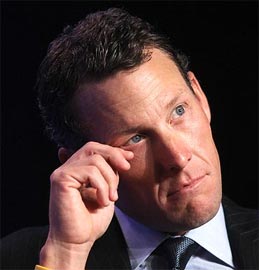The United States accused cyclist Lance Armstrong on Friday of defrauding the US Postal Service by taking its sponsorship money at the same time he was doping and using performance-enhancing drugs in violation of cycling rules.
The government joined a civil suit against Armstrong, stripped of his seven Tour de France titles and banned for life from cycling in 2012 after accusations he had cheated for years. In January, he said the accusations were true in an interview with television host Oprah Winfrey.
- Not possible to win seven Tours without doping: Armstrong
A battle with the US government over civil fraud charges threatens to sap what remains of the once-revered athlete's reputation, and hurt his wallet.
Armstrong and his team mates from Tailwind Sports wore the logo of the US Postal Service during their record-breaking wins.
 "This lawsuit is designed to help the Postal Service recoup the tens of millions of dollars it paid out to the Tailwind cycling team based on years of broken promises," Ronald Machen, the US attorney for Washington, DC, said in a statement.
"This lawsuit is designed to help the Postal Service recoup the tens of millions of dollars it paid out to the Tailwind cycling team based on years of broken promises," Ronald Machen, the US attorney for Washington, DC, said in a statement.
The sponsorship money totalled more than $30 million, the government said.
Armstrong plans to contest the suit because the Postal Service was not actually damaged, his lawyer, Robert Luskin, said.
"The Postal Service's own studies show that the service benefited tremendously from its sponsorship - benefits totalling more than $100 million," the lawyer said in a statement.
Prosecutors have said they do not expect to charge him with a crime.
Former Armstrong team mate Floyd Landis filed a sealed whistleblower suit against Armstrong in 2010. The decision by the government to join the suit triggered its unsealing.
"I had come to a point in my life where I decided that I had to tell the truth for the sake of my conscience," Landis, who also admitted to cheating, said in a statement on Friday released by his lawyer.
WHISTLEBLOWER LAW
Armstrong faces other suits arising out of his admission of cheating. This month, marketing firm SCA Promotions Inc alleged in a Texas state court that the cyclist defrauded it of $12.1 million in bonuses plus interest.
In January, two California men sued Armstrong and his book publishers, claiming that his memoirs were filled with lies but were billed as non-fiction.
The US government is suing under the False Claims Act, an 1863 law that encourages private individuals to file suit when they have evidence of fraud involving government money.
When the government believes a suit has merit, it may take over the litigation. The individuals, or whistleblowers, get a portion of the proceeds if the case is successful.
The government joins 20 to 25 percent of all False Claims Act suits filed, and the government almost always wins the cases it joins, said John Phillips, who represents whistleblowers at the Phillips & Cohen law firm.
"That's a very good sign for the case: that the government after its own investigation, after looking at all the facts and the law, has decided to join the case," said Phillips, who is not involved in the Armstrong case.
Since the law was revitalized in 1986, it has been used frequently against military contractors, pharmaceutical companies and hospitals.
PREPARED TO FIGHT
Armstrong is prepared to argue that claims over most of the sponsorship money are time-barred, a source close to his legal team said, speaking on condition of anonymity. The sponsorship agreement expired in 2004, and there is a six-year statute of limitations on recovery under a US anti-fraud law, the source said.
The source raised two other arguments that could help Armstrong. First, the sponsorship contract did not contain specific language or promises related to doping.
Second, Armstrong was not in charge of Tailwind Sports, the racing team firm that signed the contract with the Postal Service and that existed before Armstrong joined it.
Luskin is among the most sought-after defence lawyers in Washington. He represented former White House adviser Karl Rove in a case about the leak of a CIA officer's name.
Statements from government lawyers appeared to dismiss the idea that Armstrong could use the lack of specific contract language as a defence.
Armstrong and his team "agreed to play by the rules and not use performance enhancing drugs. We now know that the defendants failed to live up to their agreement," said Postal Service General Counsel Mary Anne Gibbons.
In the most recent fiscal year, the government reached $5 billion worth of settlements and court judgments under the False Claims Act - a single-year record.
"If they intervene, that puts the force of the government behind the suit," said Matthew Orwig, a former Justice Department lawyer now at the Jones Day law firm. He is not involved in the Armstrong case.
"There's the FBI, other investigative resources, Justice Department lawyers - in effect, the richest client in the world," he said.
Photographs: George Burns/Oprah Winfrey Network via Getty Images










 © 2025 Rediff.com -
© 2025 Rediff.com -